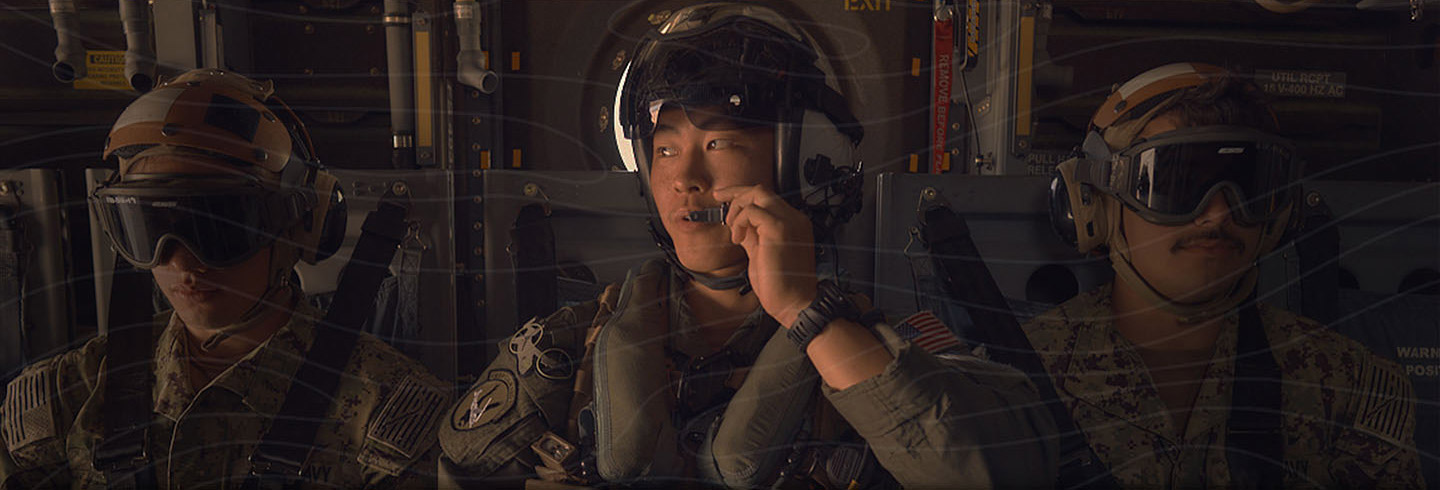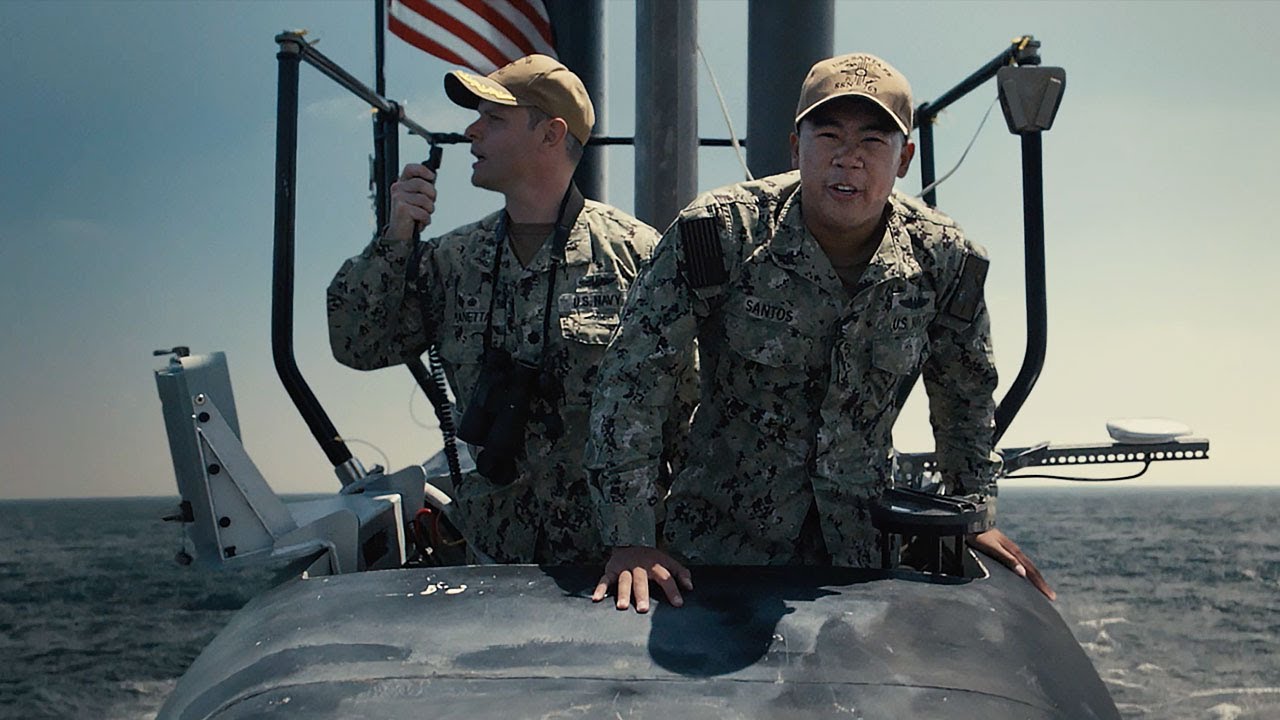Navy Career Quiz
Discover what the Navy has to offer. Whether you want to gain valuable STEM skills, hone your creative talents, or push your physical and mental limits, the Navy has the challenge for you. Take the quiz and discover your potential.

Established by President John F. Kennedy in 1962, the Navy SEALs are a nimble, elite maritime military force suited for all aspects of unconventional warfare. In this role, you will provide immediate military options amidst crises around the world.
Your duties as a SEAL may include, but are not limited to:
Navy SEALs train and work in all manner of environments, including desert and urban areas, mountains and woodlands, and jungle and arctic conditions. Typical missions may involve insertion into a combat objective by any number of means: parachute, submarine, helicopter, high-speed boat, foot patrol or by a combat swimmer insertion.
SEALs operate not only as highly capable individuals, but also as members of tightly knit units.
,SEAL training has been described as "brutal", preparing you for the extreme physical and mental challenges of SEAL missions. Preparation consists of more than 12 months of initial training that includes Basic Underwater Demolition/SEAL BUD/S School, Parachute Jump School and SEAL Qualification Training (SQT), followed by an additional 18 months of pre-deployment training and intensive specialized training. It’s all designed to push you to your physical and mental limits. If you’re up to the task, you’ll emerge in incredible physical shape and possess the necessary confidence, determination and teamwork to succeed in any combat environment. Get full details on SEAL training.
Promotion opportunities are regularly available, but are competitive and based on performance. It’s also important to note that specialized training received and work experience gained in the course of service can lead to valuable credentialing and occupational opportunities in related fields.
For those SEALs with further leadership aspirations and a college degree, Officer roles are available – providing opportunities to lead SEAL units and train aspiring SEAL warriors.
,Members of the Naval Special Warfare/Naval Special Operations (NSW/NSO) community have any number of unique opportunities to advance their knowledge. Navy training provides everything from the fundamentals of Explosive Ordnance Disposal (EOD) to knowledge of chemical and biological warfare, military tactics, deep-sea diving or a number of other tactical military procedures.
Beyond offering access to professional credentials and certifications, Navy training in the NSW/NSO community can translate to credit hours toward a bachelor’s or associate degree through the American Council on Education. You may also continue your education through opportunities like the following:
,No college degree is required to become an Enlisted Navy SEAL, but the standards of qualification require the kind of mental and physical fortitude that few possess. For those making the cut, immense challenges and constant training are a way of life.
Upon joining the Navy, you must:
Find the current minimum Navy Physical Screening Test (PST) requirements for Navy Challenge Programs here.
NOTE: You should consult your physician or other health-care professional before starting any exercise regime or other fitness program to determine if it is right for your needs. This is particularly true if you (or your family) have a history of medical illnesses or ailments that could be made worse by a change in physical activity. Do not start a fitness program if your physician or health-care provider advises against it.
General qualifications may vary depending upon whether you’re currently serving, whether you’ve served before or whether you’ve never served before.
There are no part-time jobs available for this career track.
,There are no part-time jobs available for this career track.
,There are no part-time jobs available for this career track.
,There are no part-time jobs available for this career track.
,There are no part-time jobs available for this career track.
As a SWCC, you will be called upon by your fellow Special Operations counterparts for support anywhere, anytime. You will typically:
SWCC operators may be deployed anywhere in the world and operate day or night in cold weather, desert, tropical or jungle environments.
,As a SWCC, you will undergo some of the most intense and demanding physical and mental training in the world. While qualifying for SWCC in the Delayed Entry Program is preferred, you may also volunteer any time during your enlistment after completing boot camp and prior to your 31st birthday.
While at RTC, you will take part in a rigorous physical examination and medical screening. Upon review of your entrance medical examinations, further physical screening tests will be given at RTC and at the Naval Special Warfare Center (SWCC School). Get full details on SWCC training.
Promotion opportunities are regularly available but competitive and based on performance. It’s also important to note that specialized training received and work experience gained in the course of service can lead to valuable credentialing and occupational opportunities in related fields.
,Members of the Naval Special Warfare/Naval Special Operations (NSW/NSO) community have any number of unique opportunities to advance their education. Navy training provides everything from the fundamentals of explosive ordnance disposal, to knowledge of chemical and biological warfare, military tactics, deep-sea diving or a number of other tactical military procedures.
Beyond offering access to professional credentials and certifications, Navy training in the NSW/NSO community can translate to credit hours toward a bachelor’s or associate degree through the American Council on Education. You may also continue your education through opportunities like the following:
,No college degree is required to become an Enlisted Navy SWCC operator, but the standards of qualification require the kind of mental and physical fortitude that few possess. For those making the cut, immense challenges and constant training are a way of life.
To qualify for SWCC training, you must:
Visit the Navy SWCC PST Calculator to review the current minimum Navy Physical Screening Test (PST) requirements for Navy Challenge Programs.
General qualifications may vary depending upon whether you’re currently serving, whether you’ve served before or whether you’ve never served before.
There are no part-time jobs available for this career track.
,There are no part-time jobs available for this career track.
,There are no part-time jobs available for this career track.
,There are no part-time jobs available for this career track.
,There are no part-time jobs available for this career track.
Perform emergency medical treatment on SEALs, Seabees, Marines and other military personnel injured in the field
Perform emergency dental treatment as well as construct dental crowns and bridges, process dental X-rays and operate X-ray equipment
Serve as an operating room technician for general and specialized surgery
Help administer a wide range of preventive care and medications, including immunizations and intravenous fluids
Maintain patient treatment records, conduct research and perform clinical tests
Those in the Hospital Corpsman Advanced Technical Field go beyond the duties of Hospital Corpsmen, working in austere and challenging environments while saving lives. Each of the three classifications has its own responsibilities:
Provide advanced medical care and operational services for Marine Reconnaissance, USMC Special Operations Forces and Special Operations Command personnel
Engage as a team member in direct action, special reconnaissance, foreign internal defense, irregular and unconventional warfare
Rescue patients and deliver emergency care from the back of a helicopter
Perform aircrew duties and En Route Care (ERC) for routine illness and emergent patients
Support Search and Rescue (SAR), tactical evacuation (TECEVAC), Medical Evacuation (MEDEVAC), casualty evacuation (CASEVAC) and Combat Search & Rescue (CSAR) for Navy and Marine Corps Aviation
Provide basic medicine and assist medical officers in prevention and treatment of diving related illnesses, injuries associated with deep sea diving and hyperbaric conditions
Operate, test and repair all USN diving equipment
Perform underwater inspections, harbor/port/ship security inspections, conduct ordnance searches, rescue personnel, engage in special warfare and small boat operations
Operate Swimmer Delivery Vehicle Dry-Deck Shelter system and submarine Lock-in/Lock-out systems
In medical support, you have the most diverse range of work environments in the Navy. Your job will likely take you all over the world—and far out of your comfort zone.
As a Hospital Corpsman, you could be assigned to a Navy medical treatment facility, like an on-base hospital or clinic. You could also work on an aircraft carrier in the middle of the ocean, or a submarine in the depths of the sea. You will work alongside Navy nurses and other medical professionals to be trained as a skilled first responder, whether your skills are needed bedside or in the field.
If you choose to go the Hospital Corpsman Advanced Technical Field route, you will work in extreme and sometimes dangerous conditions. From deep sea diving to combat missions to flying up in MH-60 Romeo helicopters, you will train outside the realm of conventional military forces to prepare for any mission. You may work independent of a physician or under supervision in this program.
,After you attend Boot Camp, you’ll report to Fort Sam Houston, TX, to attend “A” school for 14 weeks. Here, you’ll develop a working knowledge of basic principles and techniques of patient care and first aid procedures in preparation for your first assignment. Throughout your career, you’ll have ample opportunity to gain advanced medical skills from radiology, to physical therapy, to dental care, to heart surgery. These skills will be necessary to maintain the physical health, and on occasion, save the lives of Sailors and Marines across the fleet. You could even deploy overseas with the Marines as a Fleet Marine Force Corpsman, which requires specialty training.
After Boot Camp, you’ll report to Fort Sam Houston, TX, to attend “A” school for 14 weeks. Here, you’ll develop a working knowledge of basic principles and techniques of patient care and first aid procedures. After Corpsman “A” School, HM-ATF candidates track to one of three advanced training paths:
Areas of training include but are not limited to basic reconnaissance, airborne operations, combatant diving, demolitions, clinical diagnostics, advanced paramedical skills, Advanced Cardiac Life Support (ACLS), basic surgical anesthesia, basic veterinary medicine and basic dental exams
Areas of training include but are not limited to advanced fluid resuscitation, administration and management of Advanced Life Support medications, use of emergency medical equipment, rescue and recovery devices and patient handling
Areas of training include but are not limited to diving physics, scuba and surface-supplied air diving, recognition and treatment of diving related illnesses
Automatic promotion opportunities are available but are competitive and based on completion of pipeline. It’s also important to note that specialized training received and work experience gained in the course of service can lead to valuable credentialing and occupational opportunities in related fields.
There’s no better way to begin a successful career in healthcare than by serving in the medical support division of America’s Navy. You’ll receive training in everything from surgery to radiology, physical therapy to respiratory medicine, and more. Beyond this, you’ll have many opportunities to get the hands-on experience and credentials medical assistants require in the civilian world.
,Beyond offering access to professional credentials and certifications, Navy training in the field of medical support can translate to credit hours toward a bachelor’s or associate degree through the American Council on Education. You may continue your education through:
,General qualifications may vary depending upon whether you’re currently serving, whether you’ve served before or whether you’ve never served before. Any illegal involvement with drugs may be disqualifying.
To become a Hospital Corpsman you must have U.S. citizenship, a high school diploma or equivalent, normal color perception, vision correctable to 20/20 and meet eligibility requirements for a security clearance.
If you go the Hospital Corpsman Technical Field route, you must have U.S. citizenship, a high school diploma or equivalent, normal color perception, vision correctable to 20/20 and meet eligibility requirements for a security clearance.
Additionally, you should:
Be 28 years or younger
Agree to a minimum 6-year enlistment obligation
Undergo a Physical Screening Test (PST) and meet the following minimum standards:
Swim: 12:30 (1.5 miles)
Sit-ups: 50
Push-ups: 50
Pull-ups: 10
Run: 10:30 (500 yd / 450m)
Meet standards for Student Naval Aviator (SNA)
Have the intelligence, maturity and ability to carry out the physical demands of combat while simultaneously learning medical procedures and methodologies
Have good communication skills, writing and arithmetic ability, manual dexterity and a good memory
Have a sincere interest in providing general health care
Be resourceful, dependable and trustworthy
Perform emergency medical treatment on SEALs, Seabees, Marines and other military personnel injured in the field
Perform emergency dental treatment as well as construct dental crowns and bridges, process dental X-rays and operate X-ray equipment
Serve as an operating room technician for general and specialized surgery
Help administer a wide range of preventive care and medications, including immunizations and intravenous fluids
Maintain patient treatment records, conduct research and perform clinical tests
There are no part-time jobs available for this career track.
,General qualifications may vary depending upon whether you’re currently serving, whether you’ve served before or whether you’ve never served before. Any illegal involvement with drugs may be disqualifying.
There are no part-time jobs available for this career track.
,General qualifications may vary depending upon whether you’re currently serving, whether you’ve served before or whether you’ve never served before. Any illegal involvement with drugs may be disqualifying.
There are no part-time jobs available for this career track.
,General qualifications may vary depending upon whether you’re currently serving, whether you’ve served before or whether you’ve never served before. Any illegal involvement with drugs may be disqualifying.
There are no part-time jobs available for this career track.
,General qualifications may vary depending upon whether you’re currently serving, whether you’ve served before or whether you’ve never served before. Any illegal involvement with drugs may be disqualifying.
There are no part-time jobs available for this career track.
Travel the world to capture military operations, develop high-profile media campaigns and tell the story of America’s Navy.

Navy Musicians perform at special events, celebrations, international parades and more.

Write news releases. Answer reporters' questions. Manage the public image of America’s Navy as a valued Public Affairs Officer.

Control congestion in the skies as an Air Traffic Controller.

Lead the flight deck as an Aircraft Handling Officer.

When you become an Aircrewman Helicopter, you become the eyes and ears of the cockpit.

Become our go-to personnel in the air as an Aircrewman Mechanical.

Detect and engage threats beneath the ocean’s surface as an Aircrewman Operator.

Hunt for lurking submarines from the air as a Tactical Romeo Helicopter Aircrewman.

Manage and direct aircraft launch operations on the flight deck.

Refuel aircraft on the flight deck and keep fuel flowing to all parts of the ship.

Launch and recover aircraft on the flight deck of an aircraft carrier.

Lead flight support teams as an Aviation Maintenance Duty Officer.

Manage your ship’s stock of missiles, mines and other ordnance.

Ready to lead the launch as a Catapult Officer Shooter?

Defend from the sea to the stratosphere as a Navy Fighter Pilot.

Hunt submarines, patrol the skies or supply carriers as a Fixed Wing Pilot.

Track subsurface contacts and perform rescue missions as a Helicopter Pilot.

Uncover threats in the depths of the sea as a Naval Aircrewman Avionics.

Lead flight missions to success as a Naval Flight Officer.

Keep the Navy’s complex aircraft and helicopters in top working order.

Provide meals that keep your fellow Sailors fueled for duty.

Support and assist fellow Sailors by helping guide their career journey.

Keep your ship stocked with the equipment it needs to succeed.

Advance your own career goals while you help fellow Sailors do the same.

Keep your shipmates happy by managing ship store, laundry and barber services.

Oversee logistics and ensure your ship is supplied with everything it needs.

Become an administrative pro by managing the Navy’s paperwork and records.

If you like to solve problems using your hands, you belong with the Builders.

Design and build city-size bases, airfields and harbor facilities.

Kickstart your career with hands-on electrical experience.

Get out of the auto shop and get hands-on mechanical experience.

Start your engineering career with real-world experience as a Navy Seabee.

Work with construction equipment from bulldozers to cranes and everything in between.

Weld metal a world away as a Navy Steelworker.

Keep critical utilities systems up and running no matter where you are in the world.

Maintain and repair the complex electronic systems aboard Navy aircraft.

Use electronic systems like radar to detect threats and make your ship virtually invisible.

Maintain the navigation systems that ensure your submarine reaches its destination.

Maintain the electronic systems controlling a submarine’s vast supply of firepower.

Ready, aim, fire. Maintain ship combat readiness as a Fire Controlman.

Keep vital computer networks up and running aboard ships and submarines.

Keep our comms running smoothly as an Interior Communications Electrician.

Assemble, maintain and repair nuclear-capable ballistic missiles as a Missile Technician.

Keep our Sailors out of harm's way and defend against emergencies as a Damage Controlman.

As a Master-at-Arms, you are the Navy police. Defend by serving and protecting our own.

Keep Navy aircraft at peak performance by maintaining electrical systems and components.

Maintain the engines of the Navy’s most powerful aircraft and helicopters.

Inspect and repair aviation equipment to ensure aircraft are always flight-ready.

Maintain aircraft equipment that sustains life at every altitude.

Perform ground support operations that keep Navy aircraft flying high.

Be the person Navy pilots rely on to keep emergency equipment in top shape.

Perform honored duties as a member of the Navy’s oldest rating.

Keep the power on and the lights running aboard aircraft carriers and ships.

Move the fleet forward as an expert in diesel engine systems.

Operate the electrical systems of powerful turbine engines on Navy warships.

Maintain the mechanical systems behind our powerful turbine engines.

Maintain your ship’s guns and missile launchers, and oversee all weapons on board.

Perform metal work and welding to repair hull breaches and broken equipment.

Repair tools and fabricate parts for machinery and equipment across the ship.

Maintain vital propulsion and auxiliary systems on every inch of the ship.

Maintain the systems that make life possible on a submarine.

Serve aboard a Minesweeper to detect and neutralize underwater explosives.

Secure our underwater missile silos aboard submarines as a Torpedoman’s Mate.

Hunt for signals to provide our teams intel as a Cryptologic Technician Collection.

Translate and interpret foreign comms as a Cryptologic Technician Interpretive.

Troubleshoot and maintain top-secret equipment as a Cryptologic Technician Maintenance.

Become an expert in radar signals as a Cryptologic Technician Technical.

Lead intel operations as a Cryptologic Warfare Officer.

Defend and attack in cyberspace as a Cyber Warfare Engineer.

Perform offensive and defensive cyber operations as a Cyber Warfare Technician.

Lead your team in maintaining and securing our networks as an Information Professional Officer.

Lead the charge on national intelligence security as an Intelligence Officer.

Gather intel and prepare important briefs as an Intelligence Specialist.

Execute mission-critical cyber operations as a Maritime Cyber Warfare Officer.

Gather critical intel around your ship as an Operations Specialist.

Navigate the open seas and keep our ships on track as a Quartermaster.

Track what lies beneath the waves on a surface ship or submarine as a Sonar Technician.

Emerge as a true leader by commanding the fleet, the crew and all vital systems aboard vital Navy vessels.

Raise the bar with a legal career in the Navy JAG Corps.

Kickstart your legal career with hands-on experience in the Navy.

Engineer ways for Naval Aviators to succeed in impossible environments.

Study the psychological effects of supersonic travel on aviators.

Treat hearing issues and conduct research to preserve auditory health for Sailors and Marines.

Provide therapy services to Sailors experiencing stressors uniquely related to service.

Cut your teeth in dentistry with a job that takes you around the world.

Become a disease expert for the Navy and make outbreaks a thing of the past.

Shape policy and practice in one of the world’s foremost global health care systems.

Help save lives by assisting in critical medical departments and procedures.

Save lives in the shadows.

Eliminate workplace safety hazards so Sailors can focus on the mission at hand.

Provide laboratory services that give Navy doctors and patients the answers they seek.

Give fallen Sailors the dignity and respect they deserve as a Navy Mortician.

Join the ranks of the toughest, most talented nurses you’ll ever meet.

Rehabilitate Sailors following illness or injury with cutting-edge devices and therapy.

Diagnose and treat vision problems to ensure service members maintain excellent eyesight.

Consult with patients, dispense medication and provide guidance to people in need.

Help Sailors recover from injuries so they can get back to work.

Save lives as a Navy Physician without all the hurdles of civilian medical practice.

Work alongside surgeons and supervising physicians to deliver the best health care.

Keep Navy Sailors on their feet by treating foot and ankle injuries.

Keep fellow Sailors safe from potential radiation exposure.

Improve the health of Sailors and people across the world through mindful nutrition.

Conduct research to protect our Sailors from biological, radiological and chemical threats.

Diagnose, treat and rehabilitate Sailors with training-related injuries.

Explore cognitive and physiological psychology to keep Sailors sound in mind and body.

Counsel active and retired members and their families during times of social, psychological or emotional need.

Be a spiritual guide and moral anchor, supporting servicemembers during their most joyful moments and during their most difficult ones.

Prepare devotional materials and organize faith-based events, while also serving as a resource for Navy Chaplains.

Serve as a meteorology and oceanography expert as an Aerographer’s Mate.

Design and build city-size bases, airfields and harbor facilities.

Power the world’s strongest Navy as an Electrician’s Mate Nuclear.

Power Navy ships as an Electronics Technician Nuclear.

Design, develop and deploy the Navy’s modern combat fleet.

Maintain safety in any environment as a Navy Entomologist.

Become the Navy’s nuclear reactor mechanic as a Machinist’s Mate Nuclear.

Study the sea the and the weather in environments around the world as a METOC Officer.

Conduct medical research and trace infectious diseases to defeat biological threats.

As a Naval Reactors Engineer, you can set the standard in nuclear reactor research.

If you’re a Nuclear Power School Instructor, you’re the top expert on classified nuclear technology.

Lead and oversee a team running one of the most dynamic nuclear power plants in the world.

Take charge of a nuclear reactor on an aircraft carrier as a Nuclear Surface Warfare Officer.

Lead every department on our nuclear-powered subs as a Submarine Officer.

Brave extreme conditions so others may live.

Master high-tech tools to eliminate explosive threats.

Save lives in the shadows.

Master the depths that others can’t reach.

Everyone wants to be a Frogman on Friday.

Deliver Special Operations assets where they’re needed.

Talk to a Navy recruiter. From STEM careers to Navy life, get the answers to your burning questions.
Chat with a Navy expert about top STEM careers, unique scholarship opportunities, our culture of excellence, or any other burning questions you might have.
Closed on federal holidays.
Before you start a chat, please read our chatroom rules:
Don't see a chat button on this page? Try using a different internet browser. There is a known issue affecting some users from accessing the chat button. We are actively working to fix this issue.
Make sure you’re getting the latest updates and information about top STEM career opportunities, benefits, day-to-day life in the Navy and more. We will only use your information for our communications. You can also talk to a Navy recruiter.
* Required Field
You must be 13 years old or older to subscribe to Navy emails.

Discover what the Navy has to offer. Whether you want to gain valuable STEM skills, hone your creative talents, or push your physical and mental limits, the Navy has the challenge for you. Take the quiz and discover your potential.


Embark on covert missions, defuse bombs, dive deep in the sea and save lives in spec ops.

Provide best in-class care for Sailors and Marines committed to serving our country.

Use your skills in math and science to implement the latest technology into the fleet.
Interested in becoming part of Navy Special Operations? See if you have what it takes by testing yourself in the Physical Screening Test (PST). Check out the current leaderboard and see how you measure up against other candidates across the nation and find testing events in your area.

What will you accomplish that once felt impossible? Here you can push past your limits to fly faster than the speed of sound, serve with astronauts in the space program or work on the most powerful engines in the world. Want to see what you’re really made of? Keep in touch with us to find out.

Have a question or just want to learn more? We're here to help.



